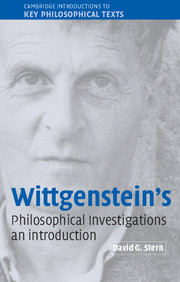Book contents
- Frontmatter
- Contents
- Acknowledgements
- Note on the text
- Introduction
- Chapter 1 Philosophical Investigations §§1–693: an elementary exposition
- Chapter 2 From the Tractatus to the Investigations: two prefaces
- Chapter 3 The opening of the Philosophical Investigations: the motto
- Chapter 4 The critique of referential theories of meaning and the paradox of ostension: §§1–64
- Chapter 5 The critique of rule-based theories of meaning and the paradox of explanation: §§65–133
- Chapter 6 The critique of rule-based theories of meaning and the paradoxes of rule-following: §§134–242
- Chapter 7 The critique of a private language and the paradox of private ostension: §§243–68
- Conclusion
- Recommended further reading
- References
- Index
Chapter 6 - The critique of rule-based theories of meaning and the paradoxes of rule-following: §§134–242
Published online by Cambridge University Press: 05 June 2012
- Frontmatter
- Contents
- Acknowledgements
- Note on the text
- Introduction
- Chapter 1 Philosophical Investigations §§1–693: an elementary exposition
- Chapter 2 From the Tractatus to the Investigations: two prefaces
- Chapter 3 The opening of the Philosophical Investigations: the motto
- Chapter 4 The critique of referential theories of meaning and the paradox of ostension: §§1–64
- Chapter 5 The critique of rule-based theories of meaning and the paradox of explanation: §§65–133
- Chapter 6 The critique of rule-based theories of meaning and the paradoxes of rule-following: §§134–242
- Chapter 7 The critique of a private language and the paradox of private ostension: §§243–68
- Conclusion
- Recommended further reading
- References
- Index
Summary
THE PARADOXES OF RULE-FOLLOWING
Sections 134–7 link the concerns of §§65–133 with those of §§138–242 by returning once more to the Tractarian claim that the general form of the proposition, the essential feature that every significant statement must possess, is that it must tell us ‘This is how things are.’ This part of the text begins with a review of the anti-Socratic strategy of §§65–71: the voice of correctness tells us that we have a concept of what a proposition is, ‘just as we also have a concept of what we mean by “game”. Asked what a proposition is – whether it is another person or ourselves that we have to answer – we shall give examples … This is the kind of way in which we have such a concept as “proposition”’ (§135). The voice of temptation responds that we can give a sharp definition of a proposition, namely that it is whatever can be true or false. In reply, the narrator points out that if this is to cast light on the nature of the proposition, we will need an independent grasp of the concept of truth and falsity ‘which we could use to determine what is and what is not a proposition’ (§136c). In that case, there would be a ‘fit’ between the concept of truth and the concept of a proposition, much as two cogwheels in a machine may engage with each other and produce movement.
- Type
- Chapter
- Information
- Wittgenstein's Philosophical InvestigationsAn Introduction, pp. 139 - 170Publisher: Cambridge University PressPrint publication year: 2004

